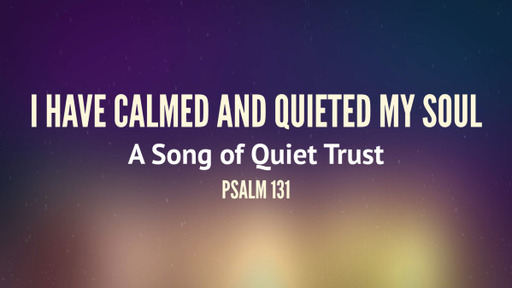I Have Calmed and Quieted My Soul: A Song of Quiet Trust

I. Those who trust in the Lord remain humble (1)
A. They are not proud or presumptuous
B. They do not attempt things too extraordinary for them
means “to be wonderful, extraordinary, surpassing, incomprehensible.” It is used regularly in the Bible to describe some work of God that is amazing or surpassing. It is occasionally translated as “difficult” or “arduous,” but it describes something that is extraordinary, beyond human abilities, and not just too hard to do
There is nothing wrong with wanting to do great things; but in this psalm with its emphasis on “proud” and “haughty” in the first line, the word here refers to acts of hubris—great activities that are beyond one’s abilities. And the implication is that being busy trying to accomplish things beyond one’s abilities is foolish.
II. Those who trust in the Lord are secure in their faith (2)
A. They have calmed their hearts in faith
David now expresses the corollary of the first point: not only does he not exhibit arrogance and ambition beyond his abilities, but has a simple but secure trust in the LORD
a) to even out, level off arable land Is 28:25; b) to settle, meaning to soothe
B. They are secure in their faith
The emblem, “like a weaned child upon his mother,” is meant to illustrate the kind of quiet, secure and safe trust the psalmist has in the LORD
III. Those who trust in the Lord encourage others in their faith (3)
In the final verse of the song David encourages the people of Israel to “hope” in the LORD. This word “hope” (יַחֵל; s.v. Ps. 31:24) is the same word used in the exhortation in Psalm 130; there the people were encouraged to hope for full forgiveness of sin. Here it is more general, encouraging people to put their full trust in the LORD rather than delude themselves into thinking they have the ability to solve all the problems of life.
A call to trust is therefore a call to humility; a refusal to trust is pride. It seems that behind the encouragement is the expectation that the LORD would intervene on their behalf—they were waiting in hope for the LORD, and he wanted the whole congregation to exhibit the kind of humble yet secure faith that he had.
The last colon extends the encouragement beyond any present need to “from this time and for ever” (a merism). It is a call for faith to wait for the LORD at all times.
The psalmist is in general exhorting the nation to exhibit such a basic, childlike faith in the LORD that enjoys complete rest and security, rather than follow an arrogant and ambitious approach to the needs and desires of this life. After all, God resists the proud, but gives grace to the humble. Genuine faith is demonstrated by a calm confidence in the Lord and not in self-sufficient ambition. The ambition of a true believer should be to please the Lord; and it is impossible to please him without faith.